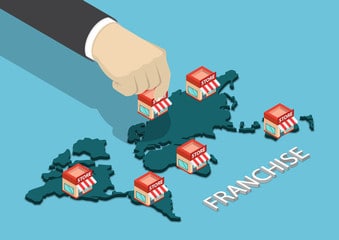The Franchise Act; always and everywhere?
In this contribution I will discuss the Franchise Act in international relationships and argue that the Franchise Act applies to many of these relationships.
Historical origins of franchising
With a bit of good will, one could say that franchising originated in the Middle Ages because of the granting of privileges by monarchs (franchisor) to cities (franchisee) to (for example) levy taxes. The cities had to hand over part of the proceeds to the monarch. Explorers could also be called franchisees, where the monarch or state that sent the explorer could be qualified as the franchisor. More concretely, Columbus was a franchisee of the Queen of Spain with the New World as its territory, from which Columbus was allowed, by agreement [1], to keep 10% of the proceeds therefrom. [2]
International franchise dynamics and legislation
Even today, franchising crosses national borders and situations arise where, for example, the franchisor and franchisee operate in different jurisdictions and foreign (non-Dutch) law has been declared applicable to the franchise agreement by the parties. The question that may arise is whether the Franchise Act applies in such international situations.
Case studies and legal complexity and international franchises
The number of variations on international case studies is almost infinite. In order not to make it too complex, I will suffice in this contribution to analyze, on the basis of a few general points of view and with the above-mentioned case within the European Union (” EU “) in mind, whether the Franchise Act can apply .
Application of the Franchise Act in an international context
First of all, in international legal relationships it is (always) important which international law regulation governs the applicable law. The (short) answer to that is that for cases within the EU, the EU Regulation (“ Regulation ”) regulates this. This Regulation allows parties to make a choice of law. Parties are therefore generally free to make their own choice about which law applies to a (franchise) agreement. In short, this freedom can only be limited by so-called priority rules of the countries in which either the franchisor or franchisee are established or the country where the franchise agreement must be executed. The logical question that follows is whether the Franchise Act aims to take precedence over the law chosen by the parties. It is important for what purpose the Franchise Act was introduced and whether there is a provision in that law that declares the Franchise Act applicable to international cases.
The protection of the franchisee: A core aspect of the Franchise Act
The explanatory memorandum to the Franchise Act states that the main purpose of the law is that the legislator sees the franchisee as a weaker party in relation to the franchisor, who must be protected through the Franchise Act. This principle – the franchisee as a weaker party – is also accepted in case law.
International legal relations
The Franchise Act also contains a provision (Article 7:922 of the Dutch Civil Code) that ties in with international legal relationships. The purpose of that article is that the Franchise Act must in any case be compulsorily applicable on Dutch territory. However, in accordance with the intention of the law – protection of the franchisee established in the Netherlands – I believe it also applies if the franchisee is established in the Netherlands and the franchisor is established abroad. In short, this leads to my analysis that the legislator intended Article 7:922 of the Dutch Civil Code to be a priority rule with a broad scope, as a result of which the Franchise Act in principle applies to many international legal relationships.
This analysis can (as far as I know, judges have not yet commented on this) have major legal and practical consequences for both the franchisor and the franchisee. In that context, I point out (for example) the obligation in the Franchise Act for the franchisor to include a goodwill provision in the franchise agreement, which obligation could therefore also apply in international cases.
Conclusion
The Franchise Act may apply to international legal relationships, as a result of which certain special obligations under that law may apply that the parties had not anticipated. It is therefore (very) wise for both the franchisee and the franchisor – if they contract in an international context – to seek expert advice on this in advance.
mr. KT op de Hoek – franchise lawyer
Ludwig & van Dam franchise lawyers, franchise legal advice
Do you want to respond?
Go to opdehoek@ludwigvandam.nl
[1] See the Capitulations of Santa Fe.
[2] See also https://zakelijk.infonu.nl/onderneming/70970-franchising-de-historie.html
Ludwig & Van Dam lawyers, franchise legal advice.
Do you want to respond? Then email to opdehoek@ludwigvandam.nl

Other messages
Article Franchise & Law No. 7 – Franchise agreement as general terms and conditions
Uniformity of the franchise formula and (therefore also) uniformity of the agreements with the franchisees will often be of great importance to the franchisor.
The franchisee’s customer base
If the partnership between a franchisee and a franchisor ends, the question of who will continue to serve the customers may arise.
The healthcare franchisor is not a healthcare provider
The Healthcare Quality, Complaints and Disputes Act (WKKGZ) creates the possibility of government measures being imposed on healthcare institutions to guarantee the required quality of healthcare.
The restructuring within the Intergamma formats from a legal perspective
The legal reality is sometimes more unruly than the factual. The controversial issue at Intergamma is a good example of this.
Open vacancy: lawyer-employee and/or lawyer-trainee!
Due to the departure of one of our colleagues, we are looking for a new lawyer-employee or lawyer-trainee. Interested?
Non-compete clause on the sale of a franchise business
How strict should a non-compete clause be when selling a franchise business to the franchisor? This question was raised in a dispute in which the District Court of Gelderland op




